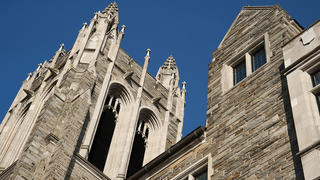SEA-PHAGES, SEA-GENES Courses Help Students Make Discoveries

Editor's note: This article was written prior to University of the Sciences' merger with and into Saint Joseph's University and does not reflect the current, combined institution. References to programs, offices, colleges, employees, etc., may be historical information.
USciences is one of 198 schools worldwide that are part of the Howard Hughes Medical Institute’s (HHMI) Science Education Alliance- Phage Hunters Advancing Genomics and Evolutionary Science (SEA-PHAGES) program. This program allows first-year students to get hands-on research experience identifying bacteriophages.
First-year students in the SEA-PHAGES lab isolate, identify, and annotate genomic DNA from bacteriophages present in soil that they collect. By the end of this process, students find that this process often leads to more questions than answers as most of the genes they identify do not have a known function.
“It’s a much more research-based experience compared to a traditional biology laboratory that students would take in their freshman year,” said Dana Pape-Zambito PhD, Undergraduate Program Director of Biological and Microbiological Sciences. “In the end that bacteriophage is unique, and it goes into a database that is searchable so other people can find and learn more about it.”
In addition to completing in-depth research, the SEA-PHAGES lab also allows first year students to hone their basic lab skills and build a solid foundation for subsequent research.
Students also become published authors at the end of this course as they share their findings in a research report and presentation.
“At the end of their first year they’ve learned all of these technical skills, they’re authors on their genomic annotation, and they also have to do a research poster presentation,” said Dr. Pape-Zambito. “They learn the scientific method first-hand, by doing all aspects from developing and testing hypotheses to presenting their findings.”
Students who complete the SEA-PHAGES lab are then given the opportunity to continue their work with the genes they identified in the next step of the process supported by HHMI, the Science Education Alliance Gene-function Exploration by a Network of Emerging Scientists (SEA-GENES) lab. This lab is offered to higher-level students who are interested in solving the mysteries of the unknown findings from the previous course.
“In this class we are taking a phage genome and we’re going to look at what it does in relation to the host bacteria,” said Michelle Kanther, PhD, assistant professor of biological sciences. “The goal of the SEA-GENES course is to identify the function of the unknown genes.”
By identifying the function of the unknown genes, the information can be used to develop phage-based therapies. Dr. Pape Zambito explains that bacteriophages are very specific to their host. This allows them to kill a specific type of bacteria without harming humans or other bacterial hosts.
“Gene therapy is a way to treat conventional diseases that might not be treatable using conventional means. The work that we’re doing is helping to build upon that, and potentially be used in gene therapies in the future,” shared Joseph Vizzarri, BMS’21, a student in the SEA-GENES lab.
Drs. Kanther and Pape-Zambito both shared that recently, several bacteriophages identified as part of the SEA- PHAGES program were used to successfully treat a patient in the United Kingdom suffering from antibiotic-resistant cystic fibrosis. By continuing to identify and understand the functions of new gene phages, scientists can develop therapeutic solutions for human disease.
Both the SEA-PHAGES and SEA-GENES labs are hands-on experiences which give students the opportunity to do unique research.
“I know a lot of our students really want that research experience- its one of the reasons they come here.” Dr. Kanther explains. “These kinds of courses, the SEA-PHAGE course and the SEA-GENES course, give you the opportunity to get in and do real research from a very early part of your career.”
